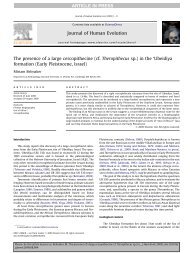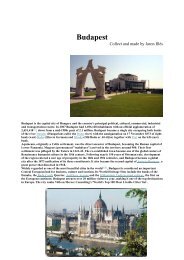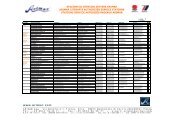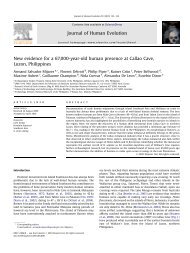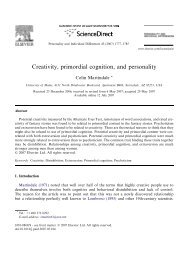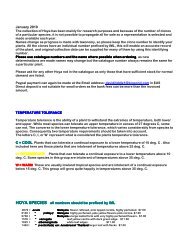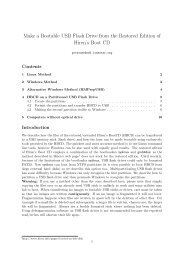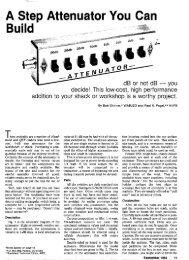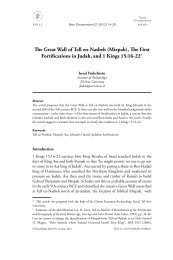David in the Service of King Achish of Gath: Renegade to His ...
David in the Service of King Achish of Gath: Renegade to His ...
David in the Service of King Achish of Gath: Renegade to His ...
You also want an ePaper? Increase the reach of your titles
YUMPU automatically turns print PDFs into web optimized ePapers that Google loves.
78 Y. Shemesh / Vetus Testamentum 57 (2007) 73-90<br />
<strong>David</strong> said <strong>to</strong> himself, “Some day I shall certa<strong>in</strong>ly perish at <strong>the</strong> hands <strong>of</strong> Saul.<br />
Th e best th<strong>in</strong>g for me is <strong>to</strong> flee <strong>to</strong> <strong>the</strong> land <strong>of</strong> <strong>the</strong> Philist<strong>in</strong>es; Saul will <strong>the</strong>n give<br />
up hunt<strong>in</strong>g me throughout <strong>the</strong> terri<strong>to</strong>ry <strong>of</strong> Israel, and I will escape him”. 14<br />
Jobl<strong>in</strong>g attributes great importance <strong>to</strong> <strong>the</strong> fact that <strong>David</strong> says this only <strong>to</strong><br />
himself (lit. <strong>to</strong> his heart). He takes this as a sign <strong>of</strong> its trustworth<strong>in</strong>ess, because<br />
<strong>David</strong> would not be ly<strong>in</strong>g <strong>to</strong> himself. I agree with Jobl<strong>in</strong>g that <strong>the</strong> <strong>in</strong>ternal<br />
monologue provides reliable <strong>in</strong>formation about <strong>David</strong>’s thoughts, but it conta<strong>in</strong>s<br />
no more than it states: <strong>David</strong> decided <strong>to</strong> flee <strong>to</strong> Philistia <strong>in</strong> order <strong>to</strong><br />
escape from Saul. We cannot <strong>in</strong>fer from it that ei<strong>the</strong>r <strong>David</strong> or <strong>the</strong> narra<strong>to</strong>r<br />
has given up <strong>the</strong> vision that <strong>David</strong> and his descendants will rule Israel, and<br />
certa<strong>in</strong>ly not that <strong>David</strong> may later be will<strong>in</strong>g <strong>to</strong> fight on <strong>the</strong> side <strong>of</strong> <strong>the</strong> Philist<strong>in</strong>es<br />
aga<strong>in</strong>st his own people. Ano<strong>the</strong>r argument put forward by Rob<strong>in</strong>son<br />
and Jobl<strong>in</strong>g <strong>in</strong> support <strong>of</strong> <strong>the</strong>ir read<strong>in</strong>gs that <strong>David</strong> was s<strong>in</strong>cere about serv<strong>in</strong>g<br />
<strong>Achish</strong> ( Jobl<strong>in</strong>g) or faced a harsh dilemma (Rob<strong>in</strong>son) is that <strong>the</strong> broader<br />
context is at variance with <strong>the</strong> idea that <strong>David</strong> would defect <strong>to</strong> <strong>the</strong> Israelite<br />
side dur<strong>in</strong>g <strong>the</strong> battle. Had Saul and <strong>David</strong> survived <strong>the</strong> battle, asks Jobl<strong>in</strong>g,<br />
“where could <strong>the</strong> s<strong>to</strong>ry go <strong>the</strong>n?”. 15 Rob<strong>in</strong>son even argues that if <strong>David</strong> had<br />
deserted <strong>to</strong> <strong>the</strong> Israelites dur<strong>in</strong>g <strong>the</strong> battle, ensur<strong>in</strong>g <strong>the</strong> defeat <strong>of</strong> <strong>the</strong> Philist<strong>in</strong>es,<br />
Samuel’s doom <strong>of</strong> Saul (1 Sam. xv 26-28; xxviii 16-19) would not have<br />
been realized. 16<br />
We must dist<strong>in</strong>guish, however, between <strong>David</strong>’s <strong>in</strong>tentions and those <strong>of</strong><br />
<strong>the</strong> s<strong>to</strong>ry about him, as well as between <strong>David</strong>’s <strong>in</strong>tentions and <strong>the</strong> consequences<br />
<strong>of</strong> his actions. <strong>David</strong> could have been <strong>to</strong>tally s<strong>in</strong>cere <strong>in</strong> his <strong>in</strong>tention<br />
<strong>to</strong> desert <strong>to</strong> <strong>the</strong> Israelite camp dur<strong>in</strong>g <strong>the</strong> battle, whe<strong>the</strong>r motivated by deepseated<br />
loyalty <strong>to</strong> Israel and Saul or by o<strong>the</strong>r reasons, some <strong>of</strong> <strong>the</strong>m utilitarian.<br />
Samuel’s announcement <strong>to</strong> Saul <strong>of</strong> his and Israel’s doom <strong>in</strong> <strong>the</strong> impend<strong>in</strong>g<br />
battle, <strong>of</strong> which <strong>David</strong> is not aware, cannot be part <strong>of</strong> <strong>David</strong>’s considerations<br />
about his conduct dur<strong>in</strong>g <strong>the</strong> battle. Never<strong>the</strong>less, <strong>the</strong> logic <strong>of</strong> <strong>the</strong> s<strong>to</strong>ry does<br />
mandate that <strong>David</strong> be removed from <strong>the</strong> battlefield. Th is is precisely what<br />
happens, <strong>in</strong> accordance with <strong>the</strong> div<strong>in</strong>e plan and <strong>in</strong> <strong>to</strong>tal isolation from<br />
<strong>David</strong>’s <strong>in</strong>tentions and desires. “Many designs are <strong>in</strong> a man’s m<strong>in</strong>d, but it is<br />
<strong>the</strong> Lord’s plan that is accomplished” (Prov. xix 21).<br />
14) Jobl<strong>in</strong>g, 1 Samuel, pp. 234, 238; idem, “<strong>David</strong> and <strong>the</strong> Philist<strong>in</strong>es”, p. 83.<br />
15) Ibid., p. 82.<br />
16) G. Rob<strong>in</strong>son, Let Us Be Like <strong>the</strong> Nations: A Commentary on <strong>the</strong> Books <strong>of</strong> 1 and 2 Samuel<br />
(Grand Rapids, 1993), p. 145.




